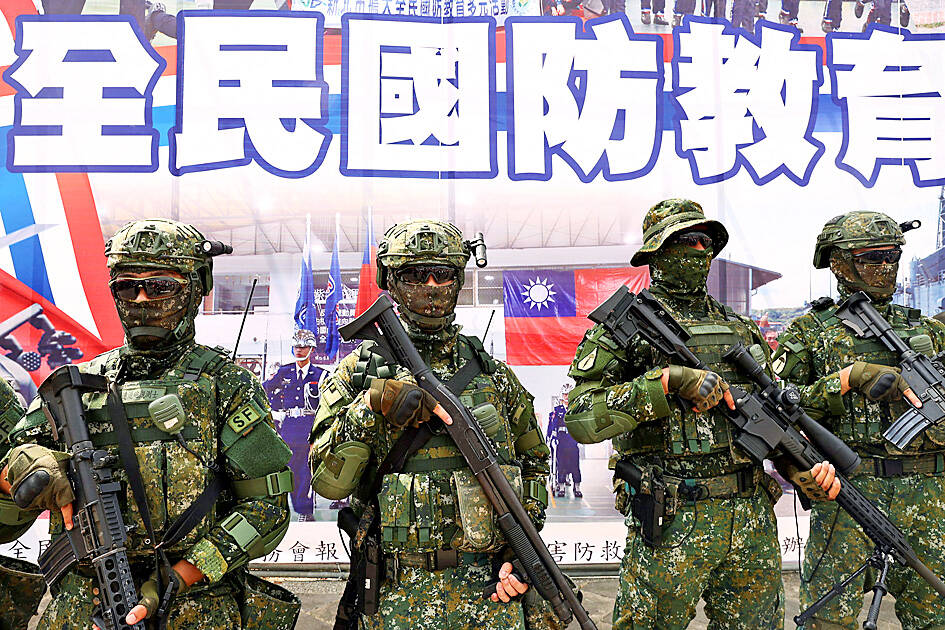Taiwan should continue to enhance military preparedness and encourage the public to fight, as the Chinese Communist Party’s (CCP) taste for risk-taking under Chinese President Xi Jinping’s (習近平) consolidated leadership remains to be seen, Taiwanese analysts said.
The CCP’s 20th National Congress concluded over the weekend with Xi retaining power for an unprecedented third term and stacking his government with loyalists.
US analysis and government figures have raised the possibility of Beijing developing the capability to attack Taiwan by 2027, with Washington pledging to provide Taiwan with the ability to resist invasion.

Photo: Ann Wang, REUTERS
China has no chance of successfully invading Taiwan, National Security Bureau Director-General Chen Ming-tong (陳明通) told legislators last week.
If China makes a show of military force as early as next year, as some pundits speculate, it would be with the goal of forcing Taiwan to the negotiating table, Chen said.
Whether the installment of Xi loyalists to the politburo would accelerate military aggression toward Taiwan remains to be seen, Institute for National Defense and Security Research analyst Su Tzu-yun (蘇紫雲) said on Sunday.
Xi might prioritize consolidating his power in his third term, although there is the possibility he could redirect internal strife toward external conflict if his grip on power wanes, Su said.
The politburo also includes military figures with a background in Taiwan issues, including Central Military Commission Vice Chairman He Weidong (何衛東) and Eastern Theater Commander Lin Xiangyang (林向陽), Su said.
The CCP “is serious about its military preparations at this stage,” he said. “We cannot afford to take them lightly.”
An absence of dissenting voices in the Central Politburo Standing Committee of the CCP could increase the chance that inaccurate information could lead the group to engage in riskier behavior, institute analyst Shu Hsiao-huang (舒孝煌) said.
The Chinese People’s Liberation Army (PLA) still needs two to three years to develop the amphibious warfare capability required to acquire Taiwan, Shu added.
Although the accuracy of PLA missiles has improved in recent years, “Taiwan is not Pearl Harbor,” Su said, meaning that the possibility of defeating Taiwan in a surprise attack is low.
Military operations in other countries have shown that the tactical success of missile strikes is gradually becoming marginal in modern warfare, despite any psychological pressure they place on those being attacked, he said.
If the PLA is unable to win in a full-scale offense and must resort to a blockade or annexing outlying islands, international sanctions could take effect, he said.
The key to facing uncertainties is to strengthen defense capabilities and encourage the public to fight, Su added.
In addition to procuring armaments and improving training as planned, Taiwan must closely observe any unusual PLA activity and formulate measures to contend with emergent threats such as drone activity and helicopter incursions across the Taiwan Strait’s median line, Shu added.

Taiwanese can file complaints with the Tourism Administration to report travel agencies if their activities caused termination of a person’s citizenship, Mainland Affairs Council Minister Chiu Chui-cheng (邱垂正) said yesterday, after a podcaster highlighted a case in which a person’s citizenship was canceled for receiving a single-use Chinese passport to enter Russia. The council is aware of incidents in which people who signed up through Chinese travel agencies for tours of Russia were told they could obtain Russian visas and fast-track border clearance, Chiu told reporters on the sidelines of an event in Taipei. However, the travel agencies actually applied

New measures aimed at making Taiwan more attractive to foreign professionals came into effect this month, the National Development Council said yesterday. Among the changes, international students at Taiwanese universities would be able to work in Taiwan without a work permit in the two years after they graduate, explainer materials provided by the council said. In addition, foreign nationals who graduated from one of the world’s top 200 universities within the past five years can also apply for a two-year open work permit. Previously, those graduates would have needed to apply for a work permit using point-based criteria or have a Taiwanese company

The Shilin District Prosecutors’ Office yesterday indicted two Taiwanese and issued a wanted notice for Pete Liu (劉作虎), founder of Shenzhen-based smartphone manufacturer OnePlus Technology Co (萬普拉斯科技), for allegedly contravening the Act Governing Relations Between the People of the Taiwan Area and the Mainland Area (臺灣地區與大陸地區人民關係條例) by poaching 70 engineers in Taiwan. Liu allegedly traveled to Taiwan at the end of 2014 and met with a Taiwanese man surnamed Lin (林) to discuss establishing a mobile software research and development (R&D) team in Taiwan, prosecutors said. Without approval from the government, Lin, following Liu’s instructions, recruited more than 70 software

Taiwanese singer Jay Chou (周杰倫) plans to take to the courts of the Australian Open for the first time as a competitor in the high-stakes 1 Point Slam. The Australian Open yesterday afternoon announced the news on its official Instagram account, welcoming Chou — who celebrates his 47th birthday on Sunday — to the star-studded lineup of the tournament’s signature warm-up event. “From being the King of Mandarin Pop filling stadiums with his music to being Kato from The Green Hornet and now shifting focus to being a dedicated tennis player — welcome @jaychou to the 1 Point Slam and #AusOpen,” the